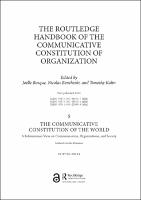Chapter 5 The Communicative Constitution of the World
Proposal review
A Luhmannian View on Communication, Organizations, and Society
Abstract
This chapter introduces Niklas Luhmann’s theory of organizations, which he conceived as communicatively constituted social systems that are created through decision-making. Decisions are thereby also understood as communicative events, ones that are inherently paradoxical as they attempt to select a certain option while simultaneously communicating discarded alternatives. Decisions are, hence, fragile events provoking opposition and rejection. Organizations can be understood as social phenomena that are capable of de-paradoxifying decisions by featuring these very decisions as their main mode of operation. However, Luhmann asserts that not only organizations, but our entire social world is constituted through communication. Against this backdrop, this chapter also highlights the role of macro-societal domains such as politics, science, economics, and love. Like organizations, these macro-societal domains can be understood as communicatively constituted systems that have certain characteristics and effects. In this respect, the Luhmannian framework offers a communication-based counterprogram to the mainstream debates of institutionalism.
Keywords
communication, organization, management, authority, agency, materiality, discourse, organizational culture, qualitative methodsDOI
10.4324/9781003224914-7ISBN
9780367480707, 9780367480721, 9781003224914Publisher
Taylor & FrancisPublisher website
https://taylorandfrancis.com/Publication date and place
2022Imprint
RoutledgeClassification
Business communication and presentation
Organizational theory and behaviour
Communication studies


 Download
Download